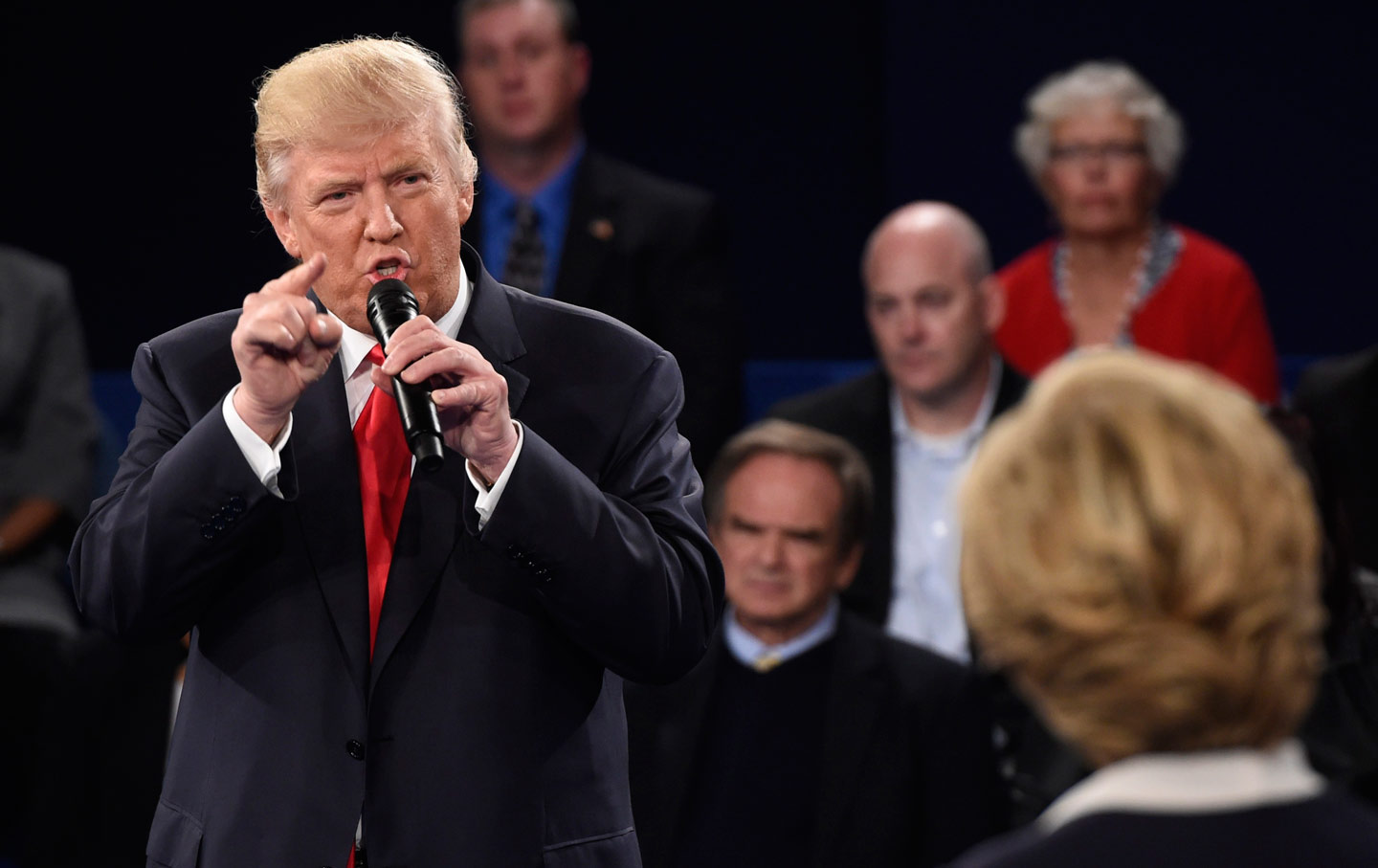
Donald Trump speaks at the presidential town-hall debate at Washington University in St. Louis on October 9, 2016. (Reuters / Saul Loeb / Pool)
The second presidential debate was preceded by a public handshake of a haunted Bill Clinton and a somber Melania Trump. It began with the two contenders refusing to shake hands. And spiraled down from there. The media will rake over the sordid highlights of a tawdry and ugly exchange. Some reflections.1
With less than a month before the election and early voting already starting, this race is over. The most insightful comment of the night was from CNN’s Van Jones, arguing that Clinton won because Trump did well in the debate. He held his own, and probably staunched the hemorrhaging of the last weeks. Republicans can’t rid themselves of him and can’t win with him.2
Clinton’s words were cutting and true. Trump dismissed his disgusting sexual boasting as “locker-room talk” which it surely was. But this also is inescapably who he is. He is not fit for the presidency. Full stop. Period.3
Early on, the Clinton campaign made the strategic choice to target Trump personally—his temperament, his ignorance, his vile divisiveness—as the central issue of the campaign. This risked getting into a sty with a pig. In ads, in surrogates, in debates, on the stump, the Clinton campaign is more about how grotesque he is than about her vision or agenda. He provided inexhaustible material for her oppo research. The media joined the hunt. Trump lived down to the part. The result is an ugly and dispiriting campaign, illustrated by the personal exchanges last night. The strategy worked: Trump exhibited just who he is. Clinton will win the election—but without a mandate, without a sense of possibility, without much of the joy that might be expected from election of the first woman president.4
The mainstream media insists on trafficking in insults, not ideas. Last night’s debate—billed as a town-hall format where voters would ask the questions—was hijacked from the start by the moderators—Anderson Cooper and Martha Raddatz. They immediately went gotcha: Trump’s foul tape was their first question and their second, then e-mails, Wiki leaks on Hillary’s speeches, Trump’s taxes, Hillary’s comment on “deplorables,” Trump’s tweets. The citizen questions, as one commentator noted, were treated like Lifesavers, used to cleanse the mouth periodically when the goings got too foul. The citizens asked most of the substantive questions of the night: on health care, on taxing the rich, on the Supreme Court, on energy. But when a debate about ideas threatened to break out—on taxes and growth, on health care, on energy policy—the moderators rushed to bring it back to the gutter.5
Trump whined repeatedly about their bias, but their bias is less partisan than prurient. Americans tuned in looking for a spitball fight and the moderators were not about to disappoint them.6
The brief and rare exchanges on ideas were revealing. Trump repeated his commitment to the failed market fundamentalism of the past—top-end tax cuts, deregulation, market competition to make health care affordable. Clinton reaffirmed her commitment to raising taxes on the top to invest in rebuilding the country. Both reiterated their opposition to our current trade policies. Trumpeting “the tremendous wealth right under our feet, Trump once more displayed his ignorance about climate change, which he has labeled a “hoax.” Clinton, curiously, expressed apparent concern about low oil prices having a “damaging effect on oil companies,” and touted energy independence, but went on to raise climate change and to repeat her mantra that we have the opportunity to become a “21st-century clean-energy superpower.” The divide on the Supreme Court was stark: Trump promising to nominate future justices in the image of Scalia who will defend the Second Amendment, and Clinton promising nominees who will repeal Citizens United, revive the Voting Rights Act, and stand up to corporations.7
On Syria, Trump’s word salad was utterly incoherent, but raised a central issue at the very end: Why aren’t we joining with Russia and Syria and Iran to take out ISIS, rather than trying to take on both our enemy and the enemies of our enemy at the same time? Clinton’s harsh rhetoric on Russian “aggression” in Syria—the Russians are there at the invitation of the government; we are the intruders aiding insurgents—and the wild rants about Putin interfering with our elections will stoke fears about her hawkish predilections.8
But the clash of ideas was a sideshow. This “debate” was an exchange of insults, egged on by the moderators. The only redeeming feature is that it will be hard to get lower than that.9
Robert L. BorosageTwitterRobert L. Borosage is a leading progressive writer and activist.